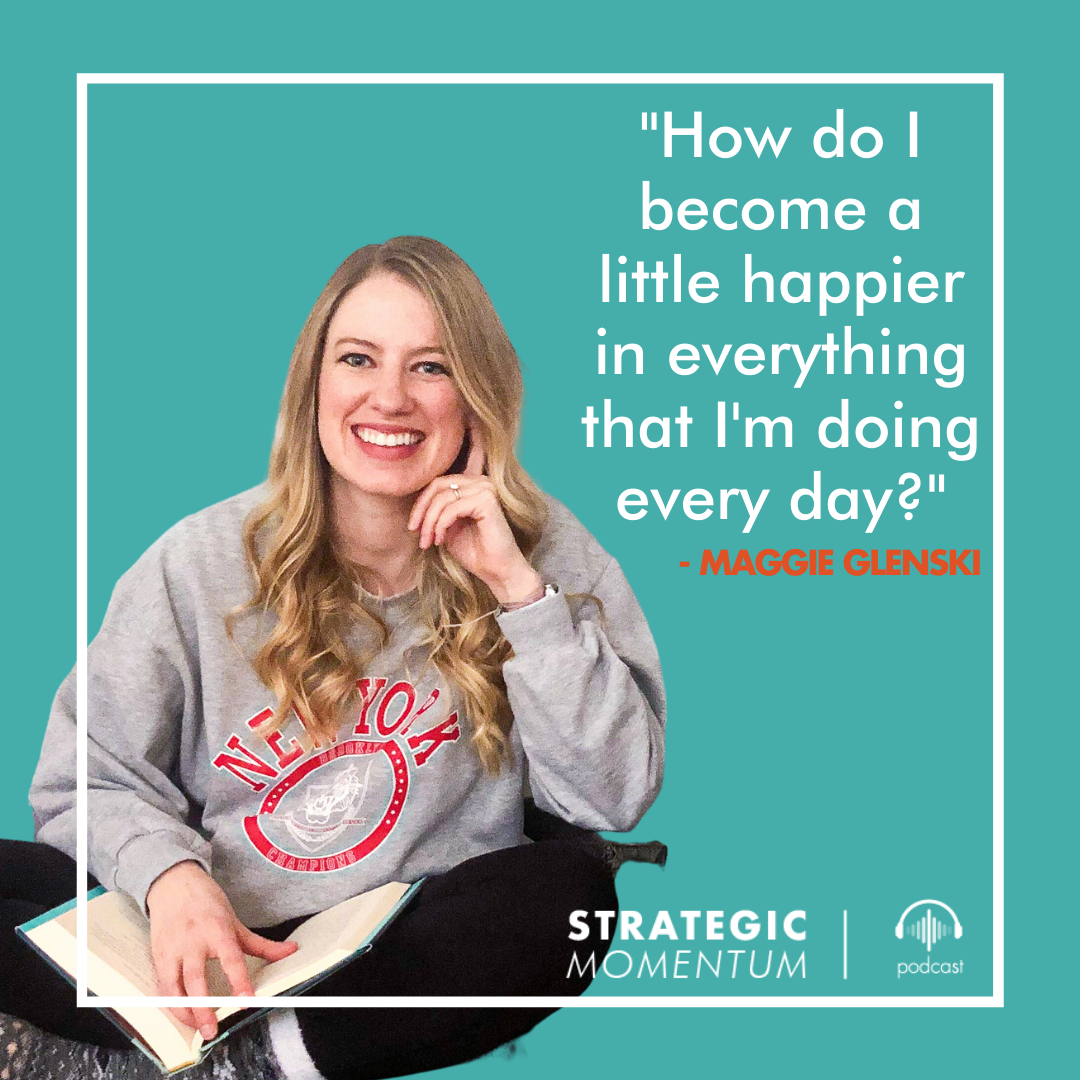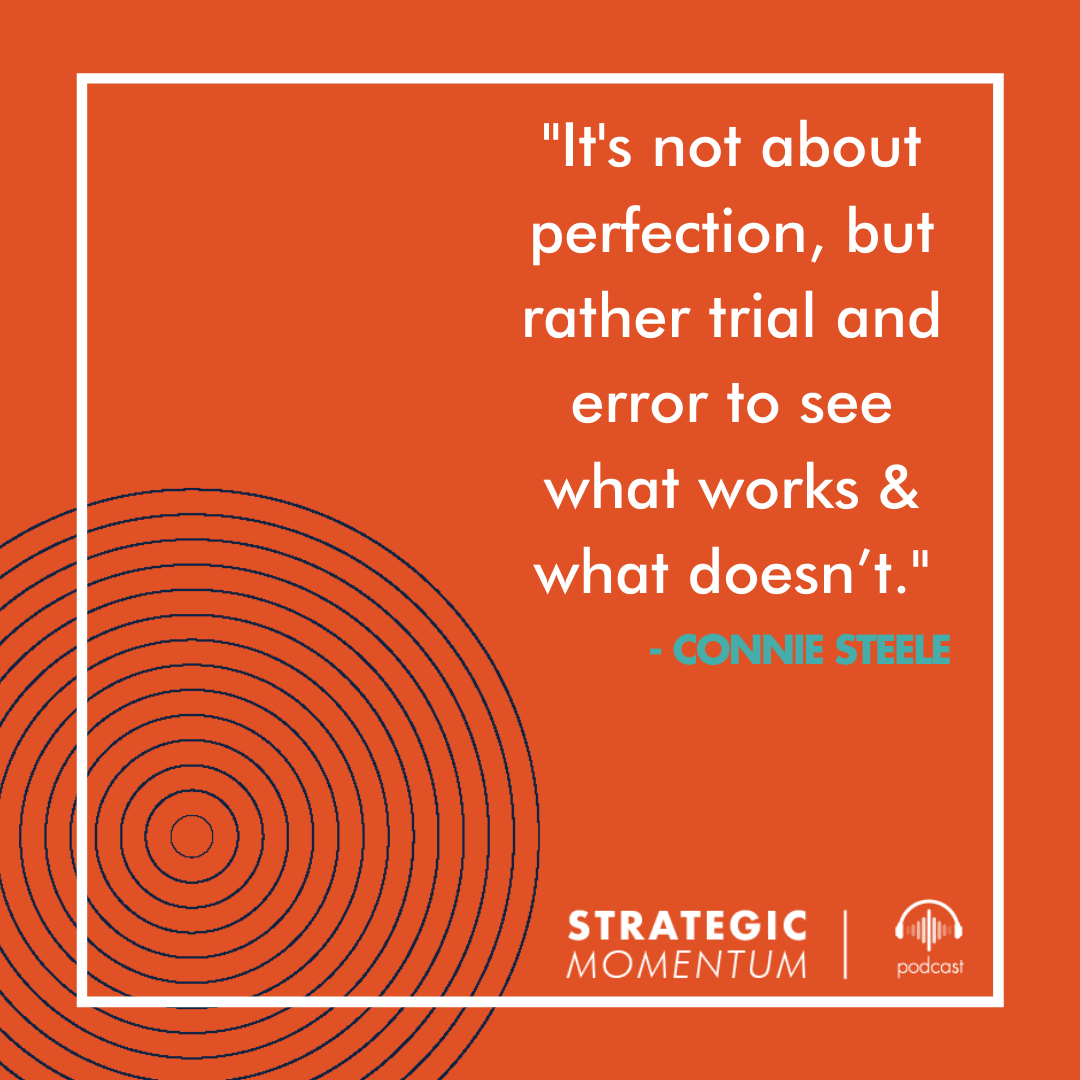Ep. 102 - Season 6 Closer: Redefining Success in a Changing World
Find Us Wherever You Listen To Podcasts
We started this season with a thesis: Creating meaningful work-life fit in today’s ever-changing world requires redefining success as progress.
Both my team and myself — and just about everyone else — have been riding the waves of this very weird year, personally and professionally. So we wanted to sit down as a team to reflect on what it has meant for us to redefine success as progress and what we learned from our guests this season.
Our guest is Maggie Glenski, Founder of Wrinkle’s Media, who made a career pivot herself earlier this year before joining our team.
How Are People Redefining Success?
“In the beginning of my career, coming out of college, I wanted to work for a top agency in New York city. Very Mad Men feels... It was, okay, how do I do my absolute best to get to the next level? And then once I hit that, how do I get to the next level then? ... And that is so far from where I am now. Now on my own, I mean, there are no titles. That doesn't matter anymore. It's more, how do I work with clients that I'm passionate about? And I want to teach them how they can grow their own business. I'm much more rewarded by being able to log off at 5:00 PM. To me, that is success.”
Maggie Glenski
“Early on, I had just a much more linear view of career success... move up the ladder and keep getting better and better positions at bigger and bigger papers... And what I've come to understand is that none of it's predictable, we're making it all up. Your future isn’t predictable. The ability to have long-term plans and be nimble in your execution is really where it’s at.”
Dorie Clark
“Just for me to be able to kind of make a living doing this and to finally feel like, okay, I'm going to be able to make a living. I'm going to be okay doing this. That was career success for me in the early days... So now fast forward, I think about my definition of success, and I'm going to quote my mentor and friend and wonderful coach Marshall Goldsmith. And Marshall Goldsmith told me about the three A's: So A is aspiration, A is ambition, and A is action.”
Alisa Cohn
“My early years were all about reading all of the sales books and being flashy; I wanted a yacht, cool jewelry... Now I just, I want to be able to have the flexibility to do what I want to do when I do it, period. I want to be able to pursue happiness without obstacles, period.”
Larisa Bolivar
“Career success has long been the ability to take off on a random Tuesday and go skiing if there's a storm, the ability to not have to ask a boss for permission to take vacation.
Nick Loper
“For me, it is not about the title or kind of like where one is in the hierarchy, but success is in the impact that you feel like you can make or how useful you think that you have been.”
Jen McDonald
My guests who spent some time in the corporate world at the beginning of their careers all shared how their priorities shifted towards their own time and the impact they make — while some of my millennial guests went into their careers knowing they wanted time freedom and the freedom to make an impact.
At the end of the day, I think we all want the same things, but we’re just now, collectively, feeling empowered to advocate for ourselves, culturally and technologically.
It’s a Long Game (That Requires Strategic Planning)
Appropriately, we started this season with an interview with Dorie Clark about her new book, "The Long Game: How to Be a Long-Term Thinker in a Short-Term World.”
This is an idea we would hear echoed in almost every episode that followed: it takes a long time to make progress and it’s easy to give up or get distracted if you’re not mindful of that. Because we’re in this for the long haul, we need to leverage basic strategic planning principles to ensure that we know where we’re going and we know when we’re starting to get off course.
Success, for most of us, is not a finite goal with an endpoint; it is the clarity that we’re working toward something.
And we can’t get that clarity without some kind of data that indicates whether we’re still headed in the right direction, or even that our goal is still the right goal for us.
The framework I use to help others do this kind of strategic planning is the Fluid Career System, an iterative process that involves getting clarity on your goals and then constantly trying new things to collect data that you can use to ensure your actions are always contributing towards your personal definition of success.
Spotting the trends (internally and externally). Because you have to get a lay of the land before you can chart a course. So this includes taking stock of what’s happening in the marketplace in addition to taking stock of yourself. What are the environments you like to work in? What are the roles, skills, and interests that you have? Where do these things intersect?
Creating your compass. This is really identifying the goal you want to work toward and then figuring out the approach (or approaches) to help you realize it.
Preparing for change. And that's all about dealing with that fear we all commonly have in starting something new or different, and really embracing that fear as part of the process. What is a small thing that you could just do and try to help you build that courage and confidence along the way? Hearing stories from people like Larisa is a huge help for me, personally, when it comes to preparing for change.
Building your network. The relationships you nurture will have a profound impact on what paths are available to you and help you get clarity on what to be aware of or even what to do along that journey.
Building your skills (hard and soft). This is continual skill development, being a lifelong learner, and Larisa reflected this during every stage of the journey that she shares in this episode.
The Fear of Getting Started & Experimenter’s Mindset
The biggest obstacle for everyone we talked to this season — and, really, for almost every guest of this podcast over the last couple of years — is that first step. Fear and inertia are extremely effective at keeping you where you are!
Adopting a data-driven, test-and-learn mindset is what’s going to keep you going when you start to feel fear or discouragement or distraction, or what Nick Loper describes as the Experimenter’s Mindset.
A critical part of the experimenter’s mindset is that you’re running multiple, smaller trials; you don’t need to have that big, million-dollar idea to start doing SOMETHING.
It’s not about perfection but rather trial and error to see what works and what doesn’t, lowering the barrier to getting started and the stakes of not hitting a home run every time. Then, you will start to feel those raindrops that Dorie mentioned — and you can use that data to reassess your roadmap.
But adopting this mindset is work. It’s hard work. Alisa Cohn goes a step further and says it’s downright unnatural, which means you have to train this muscle just like you would train at the gym. Persistence is key.
Key Takeaways:
Being busy, working more hours ≠ success, even though perceptually it may imply importance and status. In fact, it may actually obscure what our real long-term goals are.
Get clarity on what your true priorities are vs. what has been implanted in us by parents/society. Anytime something is the thing that everyone wants, it's actually ripe for re-examination.
We can often get off track during our journey because we are looking for the big-win or those who we expect to support us may not be providing the positive reinforcement we need.
Look for raindrops — those signs that signal you are making progress. These little wins will ladder up into the ultimate goal you are seeking to reach and help you shift from that short-term thinking to a long-term one.
To help you determine where you may want to go long-term or what that path may be, think about “optimizing for interesting.” It’s not about having THE answer but rather identifying what is interesting to you, trying it, seeing if there is a fit and continue doing it if there is. If not you pivot.
Remember that achieving that long-term success takes time. It may take between two to three years to see even minor signs of progress toward your big goals or as many as five before you see major signs of progress.
Success is a culmination of all the small steps you take along the way.
To break through your fear of getting started, adopt an Experimenter’s Mindset and approach. It’s not about perfection but rather trial and error to see what works and what doesn’t, lowering the barrier to getting started and the stakes of not hitting a home run every time.
Passion for the process, as opposed to the product, will likely emerge over time. Or maybe you hate the experiment — and that’s valuable data too.
Adopting the experimenter’s mindset to create a more meaningful life will only work with persistence, just like building up the habit of going to the gym.
We all fail — and we have to because there’s no other way to learn anything.
It’s critical to have clarity about who you are and what your mission or purpose is and having the integrity to stick to that regardless of the situation or potential outcome. This clarity and confidence can help you calibrate your compass so that you’re always progressing toward your goal.
You need to build that roadmap for yourself and carve out time in your calendar to do strategic thinking, reflection, and skill building in order to make progress.
That also requires setting up the ground rules/protocols on what you are going to do with that time and sticking to it.
This could be self-reflection, watching videos, online learning, getting to know your people, setting up time to have difficult conversations, etc.
What is going on inside of you that is getting in your way? When you can answer that, you unlock something.
As an entrepreneur, mental fortitude is key. It’s not going to be easy, bad things are going to happen. You need to have extreme persistence.
Recognize that you are never really stuck in the place that you are at. You do have control to make a change and chart your own course — it’s as much on you as it is the organization.
When it comes to your career and your own development, you need a vision of where you want to go and a plan to make logical steps toward it every day. It won’t always feel like progress in the moment. But a year or two down the road, you will look back and realize how far you’ve come.
Everybody's a work in progress. Nobody has it totally figured out.












